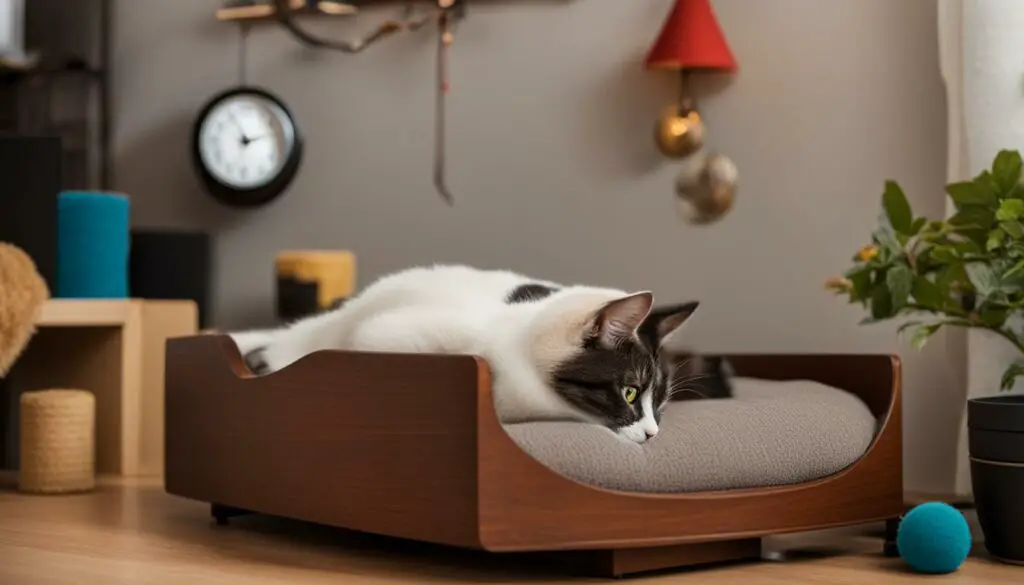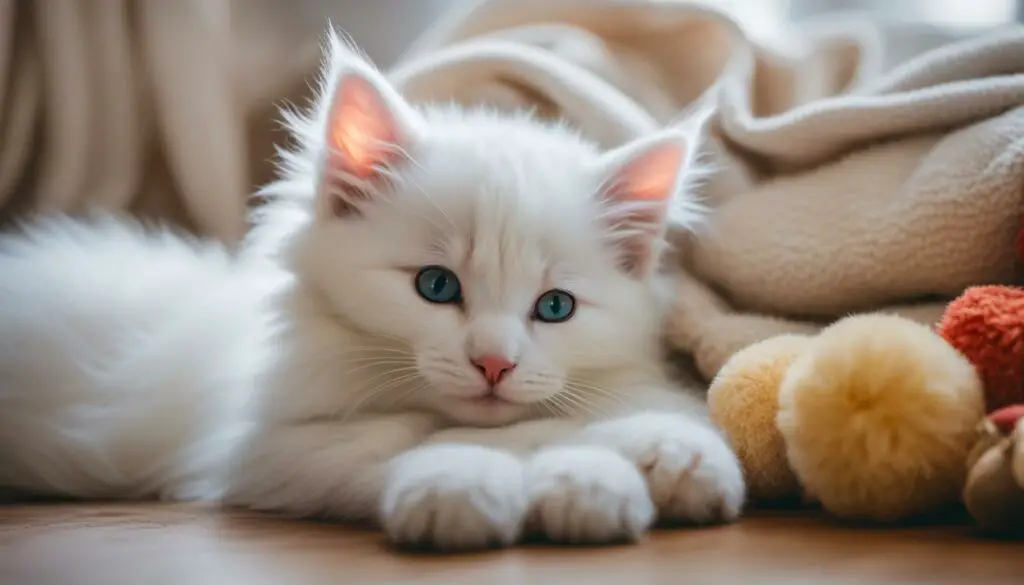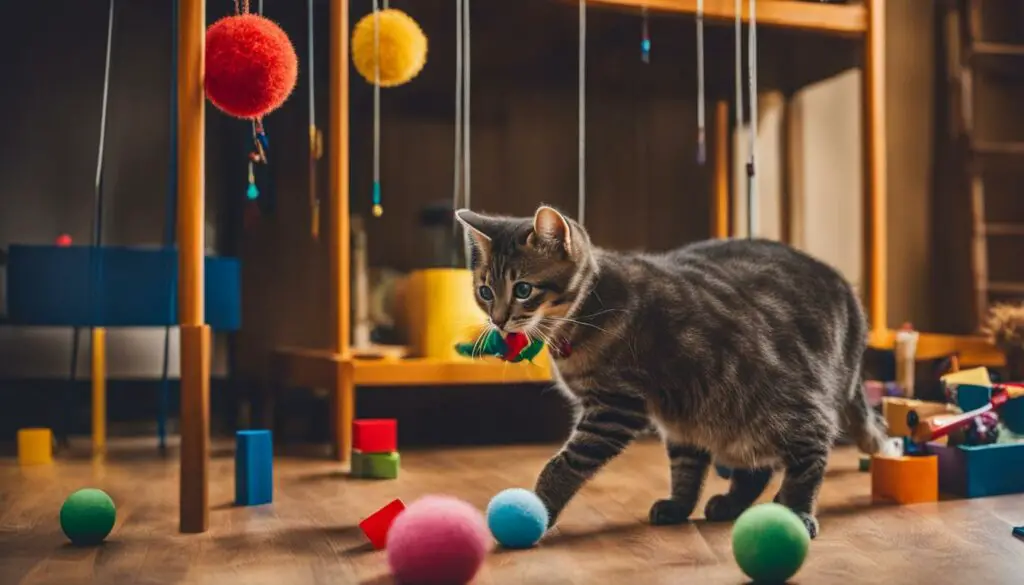Do you find yourself being woken up in the middle of the night by your beloved feline friend demanding to be fed? You’re not alone. Many cat owners experience this behavior, and it can be quite frustrating. But before you lose sleep over it, let’s delve into the reasons behind this nocturnal activity and explore solutions to help you and your cat get a peaceful night’s sleep.
Key Takeaways:
- Understanding your cat’s nighttime behavior is crucial in finding effective solutions.
- Boredom, hunger, and the need for social interaction can influence a cat’s nocturnal activity.
- Creating a routine, providing mental and physical stimulation, and establishing a feeding schedule can help prevent your cat from waking you up at night.
- Consistency, patience, and environmental enrichment play key roles in training your cat to sleep through the night.
- Consulting a veterinarian is recommended if you suspect any underlying medical issues contributing to your cat’s nighttime wakefulness.
The Environmental Factors Affecting Cat Behavior at Night
When it comes to understanding why cats wake their owners up at night, it’s essential to consider the environmental factors that influence their behavior. Cats are natural hunters, and their nighttime activity can be traced back to their ancestral instincts. While they may adapt their activity cycles to align with human schedules, there are several factors that can affect their behavior at night.
One of the primary environmental factors that can influence a cat’s behavior at night is the availability of food sources. Cats are known for their excellent hunting skills, and if they are hungry, they may resort to waking their owners up in search of food. This behavior can be particularly prevalent in cats that rely on their owners for their meals.
Another factor that can contribute to a cat’s nighttime wakefulness is human activity. Cats, being social animals, may seek attention and interaction during the night when their owners are typically at home. This desire for social interaction can manifest in behaviors such as meowing, jumping on the bed, or sitting on their owner’s head, all in an attempt to engage their owners in play or affection.
| Environmental Factors Affecting Cat Behavior at Night | Impact on Cat’s Behavior |
|---|---|
| Availability of food sources | Cats may wake their owners up at night in search of food if they are hungry. |
| Human activity | Cats may engage in attention-seeking behaviors at night to interact with their owners. |
| Boredom and loneliness | Cats may be more active at night if they are bored or craving social interaction. |
Boredom and loneliness can also contribute to a cat’s nighttime wakefulness. Cats are curious creatures and need mental and physical stimulation to stay engaged and satisfied. Without sufficient enrichment activities during the day, cats may seek stimulation during the night, resulting in behaviors that can disrupt their owners’ sleep.
Understanding these environmental factors and their impact on a cat’s behavior at night is crucial in finding effective solutions to prevent cats from waking their owners up. By addressing these factors through proper diet, routine, enrichment, and training, cat owners can help their feline companions establish healthier sleep patterns and promote better rest for both the cat and the owner.

Understanding the Impact of Training on Cats’ Behavior
Contrary to popular belief, cats are capable of being trained to modify their behaviors, including their nighttime wakefulness. By addressing the root causes of their disruptive behavior and providing alternative sources of stimulation, owners can discourage their cats from waking them up at night. Training involves creating a routine, providing enrichment activities, and using positive reinforcement techniques to reward desired behaviors.
In order to train cats to sleep through the night, it is important to identify the underlying reasons for their wakefulness. Boredom, hunger, and the need for social interaction are common factors that can contribute to a cat’s nighttime activity. By addressing these needs during the day, such as providing interactive toys, engaging in play sessions, and using puzzle feeders to provide mental and physical stimulation, cats are more likely to sleep soundly at night.
Creating a consistent routine is essential in training cats to sleep through the night. Establishing set meal times, playtimes, and grooming sessions can help regulate a cat’s energy levels and promote better sleep patterns. Cats thrive on predictability and routine, so maintaining a consistent schedule provides them with a sense of security and reduces stress.
Positive reinforcement is an effective training technique for cats. By rewarding desired behaviors with treats, praise, or playtime, cats learn to associate those behaviors with positive outcomes. When a cat displays the desired behavior, such as sleeping through the night without waking their owner, they should be rewarded immediately to reinforce that behavior. Consistency and patience are key in the training process, as it may take time for cats to fully adjust to new routines and behaviors.

Tips for Training Your Cat to Sleep Through the Night:
- Create a consistent routine for your cat, including set meal times, playtimes, and grooming sessions.
- Provide mental and physical stimulation during the day to tire your cat out before bedtime.
- Use positive reinforcement techniques, such as rewards and praise, to reinforce desired behaviors.
- Consider incorporating interactive toys and puzzle feeders to keep your cat engaged and mentally stimulated.
- Be patient and consistent in the training process, as it may take time for your cat to adjust to new routines and behaviors.
The Importance of Diet and Feeding Schedule
When it comes to understanding and preventing your cat from waking you up at night, the importance of diet and feeding schedule cannot be overlooked. Hunger is a common reason why cats meow and seek attention during the night. By ensuring that your cat is fed an adequate amount of food throughout the day and providing a satisfying meal or snack right before bedtime, you can help satisfy their hunger and encourage them to sleep through the night.
In order to establish a healthy feeding schedule for your cat, it is important to consult with your veterinarian to determine the appropriate amount of food for your cat’s age, size, and health condition. Cats have different dietary needs, and a balanced diet is essential for their overall well-being and sleep patterns. By providing them with the right amount of food at the right times, you can help regulate their energy levels and reduce their nighttime wakefulness.
It is also worth considering the type of food you are feeding your cat. Some cats may benefit from a diet that is high in protein and low in carbohydrates, as it can help keep them fuller for longer periods of time. Additionally, providing a variety of textures and flavors can help keep your cat engaged during mealtime and prevent boredom.
| Benefits of a Consistent Feeding Schedule and Nutritious Diet | Benefits of a Balanced Diet and Feeding Schedule |
|---|---|
| Regular feeding times help regulate your cat’s metabolism and promote a healthy weight. | A balanced diet provides essential nutrients for your cat’s overall health and wellbeing. |
| Promotes a sense of routine and security for your cat, reducing stress and anxiety. | Prevents overeating and reduces the risk of obesity and related health issues. |
| Helps establish a predictable schedule for your cat’s bowel movements, making litter box training easier. | Reduces the likelihood of digestive issues, such as vomiting or diarrhea. |
Remember, cats are creatures of habit, and establishing a consistent feeding schedule can help reinforce their natural sleep-wake cycle. By providing them with a nutritious diet and fulfilling their hunger before bedtime, you can reduce their nighttime meowing and create a peaceful environment for both you and your cat.
Establishing a Routine for Your Cat
If you’re tired of being woken up early by your feline friend demanding breakfast, establishing a routine can help regulate their behavior and promote better sleep patterns. Cats thrive on routine and predictability, so creating a consistent schedule for mealtimes, playtimes, and grooming can make a significant difference in their overall behavior and sleep habits.
Creating a Daily Schedule
Start by establishing set times for feeding your cat. This will help them understand that they will be fed at specific times and reduces the urgency for early morning meals. Be consistent with their feeding schedule and try to avoid free-feeding, as it can lead to irregular eating patterns. Additionally, make sure to provide them with a satisfying and nutritious meal before bedtime to help keep their hunger at bay throughout the night.
Incorporate regular play sessions into your cat’s daily routine. Engaging in interactive play, using toys that simulate hunting behaviors, can help tire them out and release excess energy. Playtime should be scheduled during the day, ideally a few hours before bedtime, to give them time to wind down and relax.
Sticking to the Routine
Once you have established a routine, it’s important to stick to it consistently. Cats thrive on predictability, and any changes can disrupt their sense of security and routine. Make sure to allocate enough time for each activity in the schedule, and try to maintain the routine even on weekends or days when your schedule may be different.
By following a consistent routine, providing mental and physical stimulation, and ensuring a satisfying diet, you can help prevent your cat from waking you up early. Remember, patience is key during the training process, and it may take some time for your cat to adjust to the new routine. With dedication and consistency, you can enjoy uninterrupted sleep and a happier, well-rested feline companion.

Section 6: Providing Mental and Physical Stimulation
When it comes to addressing your cat’s nighttime wakefulness, providing both mental and physical stimulation is key. Cats are natural hunters, and engaging their instincts through play can help reduce boredom and excess energy that may contribute to their nighttime activity. Interactive toys, such as fishing pole toys or laser pointers, can provide opportunities for your cat to chase and pounce, simulating a hunt.
| Ways to Provide Mental and Physical Stimulation | Benefits |
|---|---|
| Use puzzle feeders for mealtime | Encourages mental stimulation and slows down eating |
| Offer scratching posts and vertical spaces | Allows cats to exercise and stretch their muscles |
| Provide opportunities for interactive play | Creates a bond between you and your cat while satisfying their need for physical activity |
| Rotate and introduce new toys | Prevents boredom and keeps your cat engaged |
Engaging with your cat in play sessions before bedtime can help tire them out and promote a longer period of sleep at night. Remember to use toys that are safe and appropriate for your cat’s age and temperament. It’s important to monitor their playtime to prevent any accidents or ingestion of small parts. By providing mental and physical stimulation, you can help reduce your cat’s nighttime wakefulness and promote a more restful sleep for both of you.

Creating a Cat-Friendly Environment
In addition to playtime, it’s essential to create a cat-friendly environment that stimulates their senses. Consider placing bird feeders outside windows to provide entertainment for your cat and give them a chance to observe natural prey. You can also set up scratching posts and vertical spaces to allow them to climb and perch, satisfying their need for vertical territory. Providing hiding spots and cozy beds can create a sense of security and comfort for your cat.
- Set up bird feeders outside windows
- Provide scratching posts and vertical spaces
- Create hiding spots and cozy beds
“Interactive play sessions with your cat before bedtime can help tire them out and encourage a longer period of sleep at night.”
By enriching your cat’s environment and providing opportunities for mental and physical stimulation, you can help alleviate boredom and reduce their nighttime wakefulness. Remember to incorporate playtime and create a cat-friendly space that caters to their natural instincts. Consistency and routine, combined with a stimulating environment, can greatly contribute to your cat’s overall well-being and promote a peaceful night’s sleep for both of you.
The Training Process for Kittens
When it comes to training kittens to sleep through the night, establishing a routine is key. Kittens have bursts of energy followed by periods of sleep, and creating a structured schedule can help manage their energy levels and establish healthy sleep patterns. By incorporating play, mealtime, grooming, and sleep into a predictable cycle, you can promote better sleep habits for your furry friend.
Additionally, crate training can be an effective strategy for teaching kittens to associate nighttime with quiet and rest. By confining them to a crate at night, kittens learn that the crate is a safe and comfortable space to sleep. Gradually, as they become accustomed to the routine, kittens can transition to sleeping outside the crate.
It’s important to note that behavior modification takes time and consistency. During the training process, kittens may exhibit an “extinction burst,” where the undesired behavior intensifies before eventually subsiding. Patience and persistence are key to ensuring long-term success in training your kitten to sleep through the night.

Table: Comparing Sleep Training Methods for Kittens
| Method | Description |
|---|---|
| Routine-Based Training | Establishing a consistent schedule for play, mealtime, grooming, and sleep to manage energy levels and promote better sleep habits. |
| Crate Training | Confining kittens to a crate at night to teach them that nighttime is for rest and quiet. |
| Persistence and Consistency | Understanding that behavior modification takes time and patience, and being consistent in reinforcing desired sleep behaviors. |
In summary, training kittens to sleep through the night requires establishing a routine, incorporating crate training, and being patient during the behavior modification process. With time and consistency, you can help your kitten develop healthy sleep patterns and enjoy peaceful nights for both you and your furry companion.
Section 8: Understanding Intermittent Reinforcement and Its Effect on Cat Behavior
Cats are responsive to intermittent reinforcement, which can play a significant role in their nighttime wakefulness. Intermittent reinforcement is similar to how a slot machine works – if a behavior has been rewarded in the past, cats will continue engaging in it, hoping for a similar reward. This type of reinforcement can make it challenging to modify their behavior and stop them from waking you up at night.
To break this cycle of reinforcement, consistency and patience are key. It’s important to avoid rewarding the behavior of nighttime wakefulness, even if it means enduring a short-term increase in the intensity of the behavior. This temporary phase, known as an “extinction burst,” is a natural response from cats who are hoping for the previous reinforcement. By staying consistent and not providing any attention or reinforcement during the set sleep hours, you can gradually extinguish the behavior.
To further discourage the behavior, it’s essential to provide alternative sources of stimulation and reward desired behaviors. Engaging in interactive play sessions with your cat before bedtime can help tire them out and encourage a longer period of sleep at night. Additionally, offering mental and physical enrichment activities throughout the day can keep them engaged and satisfied, reducing their need for nighttime wakefulness.
| Key Points: | Actions to Take: |
|---|---|
| Understand the role of intermittent reinforcement. | – Avoid rewarding nighttime wakefulness – Endure the short-term increase in intensity |
| Stay consistent. | – Do not provide attention or reinforcement during set sleep hours |
| Provide alternative sources of stimulation. | – Engage in interactive play sessions before bedtime – Offer mental and physical enrichment activities throughout the day |
By implementing these strategies and understanding the impact of intermittent reinforcement, you can effectively train your cat to stop waking you up at night. Remember, consistency and patience are key, and consulting a certified feline behavior consultant can provide personalized guidance if needed.

Tips for Coping During the Training Process
Training your cat to stop waking you up at night can be challenging, but there are several tips and tricks that can help you cope during the process. Here are some strategies to maintain your own sleep while working on modifying your cat’s behavior:
- Use earplugs or a white noise machine to block out noise that may disrupt your sleep.
- Place a box fan outside the bedroom door to create a deterrent for your cat and minimize their access to your sleeping area.
- Utilize an automatic feeder to regulate your cat’s meal times, ensuring they are less likely to wake you up due to hunger.
- Install room-darkening shades to prevent external stimuli, such as streetlights or early morning sunlight, from triggering your cat’s wakefulness.
It’s important to remain consistent and not provide any attention or reinforcement during the set sleep hours. This includes avoiding eye contact, talking to your cat, or providing any form of interaction that could inadvertently encourage their nighttime wakefulness. By maintaining a consistent routine and creating an environment conducive to sleep, you can increase the chances of success during the training process.
Remember, each cat is unique, and it may take time to see significant improvements. Be patient and continue providing the necessary training and environmental enrichment to help your cat establish healthier sleep patterns.

The Importance of Environmental Enrichment
Creating a stimulating environment for your cat is crucial in preventing nighttime wakefulness. Cats are natural hunters and need mental and physical stimulation to satisfy their instincts. By offering social contact, interactive playtime with fishing pole toys, and using food puzzle toys for meal delivery, you can keep your cat engaged and entertained. This helps alleviate boredom and reduces the likelihood of your cat waking up in the middle of the night to eat.
Environmental enrichment also involves creating opportunities for sensory experiences. You can set up a cozy corner with a soft blanket and some cat-safe plants to provide your cat with a tranquil space. Vertical spaces, such as cat trees or shelves, allow them to climb and observe their surroundings. Providing scratching posts and toys with different textures can stimulate their senses and keep them occupied.
Remember, every cat is unique, so it’s important to experiment and find what activities and toys work best for your furry friend. Regularly rotate toys to keep their interest piqued. Additionally, spending time each day engaging in interactive play with your cat can help tire them out before bedtime, promoting a longer period of uninterrupted sleep.

Table: Environmental Enrichment Ideas
| Activity | Description |
|---|---|
| Interactive playtime | Use fishing pole toys or laser pointers to engage your cat in active play sessions. |
| Food puzzle toys | Provide mental stimulation by using toys that dispense treats or food gradually. |
| Vertical spaces | Invest in cat trees or wall-mounted shelves to give your cat opportunities for climbing and perching. |
| Sensory experiences | Set up a designated area with different textures, scents, and sounds for your cat to explore. |
| Scratching posts | Offer scratching posts or boards to fulfill your cat’s natural urge to scratch and stretch. |
By implementing these environmental enrichment strategies, you can help prevent your cat from waking you up at night and promote a healthier sleep routine. Remember to observe your cat’s behavior and adjust the activities and toys accordingly. A well-stimulated cat is a happy and content cat, leading to better behavioral patterns and improved overall well-being.
The Training Process for Kittens
Kittens, with their boundless energy and curiosity, can pose a unique challenge when it comes to sleep routines. To establish healthy sleep patterns for kittens, it is essential to create a structured routine that encompasses play, mealtime, grooming, and sleep.
A typical daily routine for a kitten may involve multiple bursts of play and exploration, followed by periods of rest and sleep. By engaging kittens in interactive play sessions during the day, owners can help exhaust their energy levels, making them more likely to sleep through the night.
Introducing structured meal times can also play a significant role in managing a kitten’s sleep behavior. By providing regular, well-balanced meals throughout the day, and a satisfying meal before bedtime, owners can help satisfy the kitten’s hunger and reduce the need for nighttime wakefulness.
For kittens that continue to display challenging nighttime behaviors, crate training can be an effective strategy. By gradually introducing the kitten to a crate as part of their bedtime routine, they learn that nighttime is a time for quiet and rest. Over time, the crate can be phased out as the kitten becomes accustomed to the routine and learns to sleep peacefully outside the crate.

The Benefits of Crate Training for Kittens
Crate training provides a safe and comforting space for kittens to sleep, reducing the chances of nighttime mischief. It also helps establish a sense of security and routine, leading to more restful sleep for both the kitten and its owner.
| Benefits of Crate Training for Kittens | Explanation |
|---|---|
| Provides a Safe Space | A crate offers a secure and confined area for kittens to sleep, reducing the risk of accidents or damage during the night. |
| Promotes Better Sleep | By associating the crate with rest and relaxation, kittens learn to settle down and sleep peacefully, leading to improved sleep patterns. |
| Prevents Nighttime Disturbances | With a designated sleeping area, kittens are less likely to engage in disruptive behaviors, preventing them from waking their owners up at night. |
Remember, every kitten is different, and what works for one may not work for another. Patience, consistency, and a deep understanding of your kitten’s needs and behaviors are key to successfully managing their sleep patterns.
The Challenging Phase of Behavior Modification
Modifying a cat’s behavior can be a challenging process, especially when it comes to addressing nighttime wakefulness. During this phase, it’s common for the cat’s behavior to intensify in what is known as an “extinction burst.” This temporary phase occurs when the cat engages in the behavior more persistently, hoping for the previous reinforcement. It’s important for cat owners to remain consistent and patient during this phase, as the behavior will eventually subside with continued training and reinforcement of desired behaviors.
One of the most crucial aspects of behavior modification is avoiding any form of reinforcement or attention during the set sleep hours. By not responding to the cat’s attempts to wake you up, you can help extinguish the behavior. This may involve using earplugs or a white noise machine to block out noise, placing a fan outside the bedroom door as a deterrent for the cat, or using room-darkening shades to prevent external stimuli from triggering wakefulness.
Consistency and patience are key during the challenging phase of behavior modification. It’s important to continue implementing the training techniques and strategies mentioned earlier, providing alternative sources of stimulation, maintaining a consistent routine, and using positive reinforcement to reward desired behaviors. By remaining committed to the process, cat owners can gradually train their feline companions to sleep through the night peacefully.

In summary, the challenging phase of behavior modification during nighttime wakefulness can be overcome with perseverance and the right strategies. By understanding the concept of extinction bursts and remaining consistent in providing alternative sources of stimulation and reinforcing desired behaviors, cat owners can effectively address the issue. Remember, seeking professional help from a certified feline behavior consultant and consulting a veterinarian if there are any underlying medical issues are important steps if the training techniques mentioned above do not lead to significant improvements.
Section 13: Seeking Professional Help for Persistent Issues
If the training techniques and strategies mentioned above do not lead to significant improvements in your cat’s nighttime wakefulness, it may be beneficial to consult a certified feline behavior consultant. They can offer personalized guidance, identify underlying causes, and provide specific strategies to address the persistent issues.
Professional help can be invaluable when dealing with complex or persistent behavioral problems. A feline behavior consultant will thoroughly assess your cat’s behavior, environment, and lifestyle to determine the root causes of their nighttime wakefulness. They will create a tailored behavior modification plan that addresses these specific issues and provides you with step-by-step instructions to follow.
Consulting a professional also ensures that any underlying medical issues are ruled out or properly addressed. Sudden changes in a cat’s behavior, especially if accompanied by other symptoms, may indicate an underlying health problem that requires veterinary attention. A behavior consultant will work closely with your veterinarian to provide a comprehensive approach to managing your cat’s nighttime wakefulness.
Quotes:
“Working with a feline behavior consultant can make a world of difference in addressing your cat’s nighttime wakefulness. They have the knowledge and expertise to devise an effective behavior modification plan and provide ongoing support throughout the training process.”
– Dr. Sarah Johnson, Certified Feline Behavior Consultant
“It’s important not to underestimate the impact of professional help when it comes to modifying a cat’s behavior. By collaborating with a behavior consultant, you can gain valuable insights and implement targeted strategies to alleviate your cat’s nighttime wakefulness.”
– Emma Patterson, Professional Cat Trainer
Remember, every cat is unique, and what works for one may not work for another. Seeking professional help ensures that you receive expert guidance tailored to your specific situation, increasing the chances of success in resolving your cat’s nighttime wakefulness.
| Benefits of Consulting a Feline Behavior Consultant | Why it’s Worth Considering |
|---|---|
| Personalized guidance | Receive tailored strategies for your cat’s specific behavior issues. |
| In-depth assessment | Identify underlying causes and develop a comprehensive behavior modification plan. |
| Collaboration with veterinarians | Ensure that any underlying medical issues are properly addressed. |
| Ongoing support | Benefit from expert guidance and troubleshooting throughout the training process. |
Understanding When Medical Issues Might be the Cause
When your cat keeps waking you up at night, it can be frustrating and disruptive to both your sleep and daily routine. While there are several behavioral factors that can contribute to your cat’s nighttime wakefulness, it’s important to consider the possibility of underlying medical issues. Sudden changes in your cat’s behavior, especially if accompanied by other symptoms, may indicate a need for veterinary attention.
Cats are known for their ability to hide signs of illness, so it’s crucial to be observant and proactive when it comes to your furry friend’s well-being. If your cat’s nighttime wakefulness is a new behavior, it’s important to rule out any potential medical causes. Conditions such as pain, infection, hyperthyroidism, or dental problems can all contribute to changes in behavior, including increased nighttime activity.
When assessing your cat’s behavior, pay close attention to changes in appetite, litter box habits, energy levels, grooming patterns, and overall demeanor. If you notice any concerning symptoms or if your cat’s behavior continues to persist despite your efforts to address behavioral factors, it’s recommended to consult with a veterinarian. They can help identify any underlying medical issues and provide the necessary treatment or management options.
Remember, your cat’s health and well-being should always be a top priority. By seeking medical attention when necessary, you can ensure that any underlying medical issues are addressed, providing relief for both you and your feline companion.
The Importance of Understanding Your Cat’s Nighttime Behavior
As a cat owner, I understand the frustration of being woken up at night by a hungry feline. But before you lose sleep over it, let’s take a closer look at why cats exhibit this behavior and how we can address it.
Cats have their own unique nocturnal instincts and needs, and their nighttime activity can be influenced by factors like boredom, hunger, and the need for social interaction. However, it’s important to remember that with patience and consistency, we can modify their behavior and promote better sleep patterns for ourselves.
One of the key factors to consider is your cat’s diet and feeding schedule. Ensuring that they are fed adequate amounts throughout the day and providing a satisfying meal or snack right before bedtime can help satisfy their hunger and discourage nighttime wakefulness.
Another important aspect is environmental enrichment. Cats need both mental and physical stimulation to reduce boredom and excess energy. By offering interactive toys, puzzle feeders, and opportunities for play, we can keep them engaged and tire them out before bedtime.
Remember, training your cat requires patience and consistency. Establishing a routine, providing mental and physical stimulation, and addressing any underlying medical issues are all vital steps in helping your cat sleep through the night. If you’re facing persistent issues, don’t hesitate to seek professional help from a certified feline behavior consultant.
To sum it up:
Understanding your cat’s nighttime behavior is the first step in finding effective solutions. By addressing factors like hunger, boredom, and the need for social interaction, you can modify your cat’s behavior and promote better sleep patterns for both of you. Remember, consistency, patience, and environmental enrichment play key roles in training your cat to sleep through the night.
FAQ
Why is my cat waking me up at night?
Cats may exhibit various behaviors that wake their owners up at night, such as meowing, jumping on the bed, or sitting on their heads. These behaviors can be influenced by factors like boredom, hunger, and the need for social interaction.
How can I prevent my cat from waking me up at night?
You can prevent your cat from waking you up at night by addressing the root causes of their behavior. This can include providing mental and physical stimulation, establishing a routine, and addressing hunger with an appropriate feeding schedule.
What can I do to stop my cat from waking me up at night to eat?
To stop your cat from waking you up at night to eat, ensure that they are fed adequate amounts throughout the day. You can also provide a satisfying meal or snack right before bedtime to help satisfy their hunger and encourage them to sleep through the night.
How do I establish a routine for my cat to promote better sleep patterns?
Cats thrive on routine and predictability. You can establish a routine for your cat by creating consistent mealtimes, playtimes, and grooming sessions. This helps regulate their energy levels and promotes better sleep at night.
What can I do to provide mental and physical stimulation for my cat during the day?
To provide mental and physical stimulation for your cat, offer interactive toys, puzzle feeders, scratching posts, and opportunities for play. Engaging in play sessions with your cat before bedtime can help tire them out and encourage a longer period of sleep at night.
Are there any strategies I can use to prevent my cat from waking me up at night?
Yes, crate training can be effective for kittens and can help teach them that nighttime is a time for quiet and rest. Other strategies can include using white noise machines, automatic feeders, and room-darkening shades to create a more conducive sleeping environment.
Why does my cat continue to wake me up at night even after I’ve tried training techniques?
Cats are responsive to intermittent reinforcement. If a behavior of waking their owners up at night has been rewarded in the past, they will continue to engage in it. Breaking this cycle of reinforcement requires consistency and patience, as the behavior may initially intensify before subsiding.
How can I cope with the training process and maintain my own sleep?
To maintain your own sleep during the training process, you can use earplugs or a white noise machine to block out noise. Placing a box fan outside the bedroom door can create a deterrent for your cat. It’s important to remain consistent and not provide any attention or reinforcement during the set sleep hours.
What is the importance of environmental enrichment for cats?
Environmental enrichment is crucial for alleviating boredom and reducing nighttime wakefulness. This can include offering social contact, interactive playtime, using food puzzle toys, and creating opportunities for sensory experiences through environmental enrichment activities.
How can I train kittens to establish healthy sleep patterns?
Creating a routine based on a cycle of play, mealtime, grooming, and sleep can help manage their energy levels. Crate training can also be beneficial for kittens, providing them with a safe and quiet space for rest.
What is the challenging phase of behavior modification?
The challenging phase of behavior modification is known as the “extinction burst.” This is a temporary phase where the cat’s behavior may intensify before eventually subsiding. Consistency and patience are important during this phase.
When should I seek professional help for persistent issues?
If the training techniques and strategies mentioned do not lead to significant improvements, it may be beneficial to consult a certified feline behavior consultant. They can offer personalized guidance and identify underlying causes to address persistent issues.
Should I be concerned if my cat’s nighttime behavior suddenly changes?
Sudden changes in a cat’s nighttime behavior, especially if accompanied by other symptoms, may be an indication of underlying medical issues. It’s important to consult a veterinarian if your cat’s behavior suddenly changes or if you suspect any underlying health issues.








